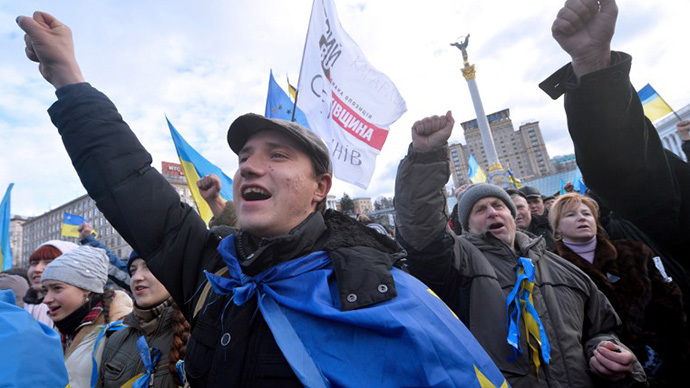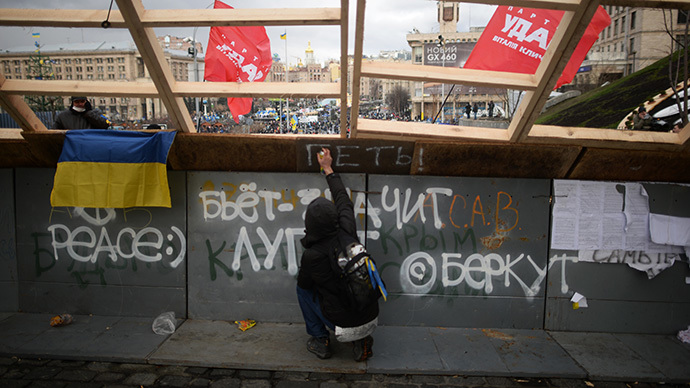‘No going back for Yanukovich now’

If the Ukrainian president goes back on the deal with the EU, he’ll disappoint his supporters and he’s obviously not going to regain the support of those who are protesting, author and blogger Anatoly Karlin told RT.
The political conflict in Ukraine has reached "boiling point," Martin McCauley, author and Russia analyst, told RT. "The government is in danger because the economy is weak and living standards are poor," McCauley said. He claims that “the riot police are in a very difficult position; they have to decide whether to use force against protesters. If they believe Yanukovich will survive, then they can use force and perhaps crack a few heads. If they begin to believe that the government will fall, then they will draw back as they don’t want to be blamed by the next government for this violence. The same refers to the military - they also have to think twice."
RT:President Yanukovich is being accused of betraying national interests by turning down the EU deal, but he says it's bad for the economy. Do you agree with Yanukovich and what are his options at this point?
Anatoly Karlin: We have to look at this objectively. What the EU was offering was $600 million for many years and perhaps some help with negotiating an IMF loan. The IMF loan was much bigger, $16 billion , but it came with some conditions such as salary freeze, spending cuts, 40 percent rise in gas prices.
With the elections coming up in March 2015, Yanukovich simply cannot afford to accede to those demands, especially since the EU is demanding a lot, but isn’t giving a lot. For instance, there is no visa-free travel; free trade between Europe and Ukraine will destroy a lot of heavy industry, especially in the eastern part of the country, where Yanukovich and the Party of Regions have a lot of their electorate.
On the other hand, young people who are more disposed against Yanukovich are not to going to get the labor movement, they are going to be able to emigrate to Athens and Dublin, they are going to vote against them instead. So it’s not surprising that Yanukovich rejected the EU deal simply because Russia is offering better conditions in terms of money, about $10 billion, when the EU says $600 million.
RT: What can Yanukovich do at this point? He has perhaps these reasoned arguments for not wanting a deal with the EU, but here are hundreds of thousands of people on the streets, he has to deal with them somehow. What do you think is the best move?
AK: I think he’s got to seek [a diplomatic way] out, there
is no going back now. If he does go back, then he is also going
to disappoint his system’s supporters, who support his current
course and he is obviously not going to get back the support of
those who are protesting. Another thing we have to bear in mind
is that even the Orange Revolution in 2004 was not made by the
street, it was made by a court judgment which ruled that the
elections were illegitimate and called for new elections.

RT:The EU agreement could still be revisited later. Why did the opposition choose violent protests instead of having more dialogue about the pros and cons of integration with the EU?
AK: I think because, first of all, slogans work better than decent arguments about the economics, which frankly don’t interest too many people. Secondly, it appears to be basically that Eastern Ukrainians support the Party of Regions - they are more politically apathetic in general, whereas Central Ukrainians and Western Ukrainians are willing to go out, protest and make their voices heard. The opposition really has the sense to go out and galvanize people.
RT:Who do you think stands to benefit from this unrest? Is there more to these protests than just a trade deal?
AK: I don’t think anybody stands to benefit. First of all, although these protests went off peacefully, today [Sunday] they went into the other direction, we had those hilarious scenes of the bulldozer trying to plow into the police forces guarding government buildings in Kiev and Molotov cocktails being thrown at police, and although this makes good TV footage, there is also going to be a lot of people who are staying at their homes, who are witnessing this, who will be turned off by this violence.
I don’t think this will benefit the opposition in the long term, once tempers cool down. Another winter is coming, it’s getting colder, people aren’t willing to stand out in the cold to protest during January. It’s obviously not doing any good for Ukrainian economy either because it’s in a poorly enough state as it is, there’s debt repayments coming up and it would really be in its favor of Ukraine to focus more on technocratic economic side as opposed to these political games.
The statements, views and opinions expressed in this column are solely those of the author and do not necessarily represent those of RT.
The statements, views and opinions expressed in this column are solely those of the author and do not necessarily represent those of RT.












